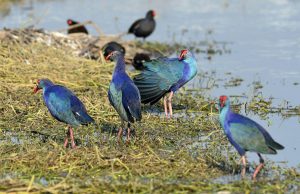India has added four new Ramsar sites:

India has added four new Ramsar sites, taking the total to 89. Tamil Nadu leads with 20 wetlands, while Sikkim and Jharkhand added their first Ramsar sites, marking a significant step in wetland conservation.
- Therthangal Bird Sanctuary Tamil Nadu Established on December 15, 2010, to conserve avian species and wetland habitats.
- Covers 29.29 hectares, home to diverse flora like Aponogeton nutans, Hydrilla verticillata, and Tamarindus indica.
- Popular among birdwatchers during the migratory season (October to March).
- Sakkarakottai Bird Sanctuary Tamil Nadu Established on April 17, 2012, to protect avifauna and wetland ecosystems.
- Spreads over 230.490 hectares, hosting flora like Neem, Palmyra Palm, and Gloriosa superba.
- Home to diverse fauna, including Lion-tailed Macaque, Giant Squirrel, and migratory birds.
- Khecheopalri Wetland Sikkim Sacred for both Buddhists and Hindus, believed to be a wish-fulfilling lake.
- Local name: Sho Dzo Sho (‘Oh Lady, Sit Here’).
- Part of the revered Demazong valley and Buddhist pilgrimage circuit.
- Unique feature: Birds prevent leaves from floating on the lake by picking them up.
- Home to diverse bird species like house swifts, fishing eagles, and Brahminy kites.
- Integral to ecotourism and biodiversity conservation efforts in Sikkim.
- Udhwa Lake Jharkhand : Comprises two large water bodies: Pataura Jheel (155 ha) and Brahma Jamalpur Jheel (410 ha).
- Notified as a bird sanctuary in 1991 due to its rich avian biodiversity.
- Attracts migratory birds during winter, starting as early as September.
- Located near the sacred Ganga River stream, enhancing its scenic beauty and ecological significance.
- Provides an ideal habitat for nesting, roosting, and survival of resident and migratory birds.




